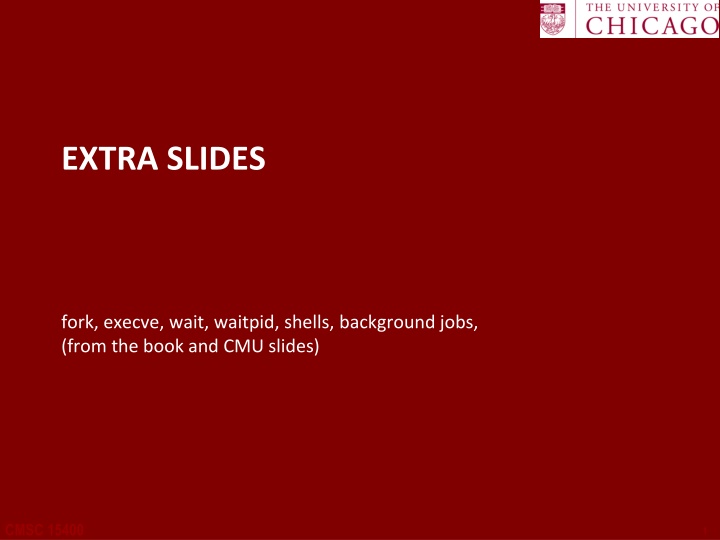
Fork and Process Management at Carnegie Mellon
Explore the concepts of fork, execve, wait, waitpid, shells, background jobs, and more through Carnegie Mellon's informative slides on process management. Dive into examples illustrating parent-child relationships and forking behavior, providing insights into process control and execution flow. Gain a deeper understanding of how processes interact and communicate in an operating system environment.
Download Presentation

Please find below an Image/Link to download the presentation.
The content on the website is provided AS IS for your information and personal use only. It may not be sold, licensed, or shared on other websites without obtaining consent from the author. If you encounter any issues during the download, it is possible that the publisher has removed the file from their server.
You are allowed to download the files provided on this website for personal or commercial use, subject to the condition that they are used lawfully. All files are the property of their respective owners.
The content on the website is provided AS IS for your information and personal use only. It may not be sold, licensed, or shared on other websites without obtaining consent from the author.
E N D
Presentation Transcript
Carnegie Mellon EXTRA SLIDES fork, execve, wait, waitpid, shells, background jobs, (from the book and CMU slides) CMSC 15400 1
Carnegie Mellon Understanding fork Process n Child Process m pid_t pid = fork(); if (pid == 0) { printf("hello from child\n"); } else { printf("hello from parent\n"); } pid_t pid = fork(); if (pid == 0) { printf("hello from child\n"); } else { printf("hello from parent\n"); } pid_t pid = fork(); if (pid == 0) { printf("hello from child\n"); } else { printf("hello from parent\n"); } pid_t pid = fork(); if (pid == 0) { printf("hello from child\n"); } else { printf("hello from parent\n"); } pid = m pid = 0 pid_t pid = fork(); if (pid == 0) { printf("hello from child\n"); } else { printf("hello from parent\n"); } pid_t pid = fork(); if (pid == 0) { printf("hello from child\n"); } else { printf("hello from parent\n"); } hello from parent hello from child Which one is first? CMSC 15400 2
Carnegie Mellon Fork Example #1 Parent and child both run same code Distinguish parent from child by return value from fork Start with same state, but each has private copy Including shared output file descriptor Relative ordering of their print statements undefined void fork1() { int x = 1; pid_t pid = fork(); if (pid == 0) { printf("Child has x = %d\n", ++x); } else { printf("Parent has x = %d\n", --x); } printf("Bye from process %d with x = %d\n", getpid(), x); } CMSC 15400 3
Carnegie Mellon Fork Example #5 Both parent and child can continue forking void fork5() { printf("L0\n"); if (fork() == 0) { printf("L1\n"); if (fork() == 0) { printf("L2\n"); fork(); } } printf("Bye\n"); } Bye L2 Bye L1 Bye L0 Bye http://csapp.cs.cmu.edu/public/waside/waside-graphs.pdf Provides useful further information about the topological sort of nodes in graph CMSC 15400 4
Carnegie Mellon exit: Ending a process void exit(int status) exits a process Normally return with status 0 atexit()registers functions to be executed upon exit void cleanup(void) { printf("cleaning up\n"); } void fork6() { atexit(cleanup); fork(); exit(0); } CMSC 15400 5
Carnegie Mellon wait: Synchronizing with Children int wait(int *child_status) suspends current process until one of its children terminates return value is the pid of the child process that terminated if child_status!= NULL, then the object it points to will be set to a status indicating why the child process terminated If the status argument is non-NULL, then waitpid encodes status information about the child that caused the return in the status argument. The wait.h include file defines several macros for interpreting the status argument. Including: WIFEXITED(status): Returns true if the child terminated normally, via a call to exit or a return. WEXITSTATUS(status): Returns the exit status of a normally terminated child. This status is only defined if WIFEXITED returned true. CMSC 15400 6
Carnegie Mellon wait: Synchronizing with Children void fork9() { int child_status; if (fork() == 0) { printf("HC: hello from child\n"); } else { printf("HP: hello from parent\n"); wait(&child_status); printf("CT: child has terminated\n"); } printf("Bye\n"); exit(); } HC Bye HP CT Bye HC: Hello from child Bye HP: Hello from parent CT: Child has terminated Bye HP: Hello from parent HC: Hello from child Bye CT: Child has terminated Bye HC: Hello from child HP: Hello from parent Bye CT: Child has terminated Bye CMSC 15400 7
Carnegie Mellon wait() Example If multiple children completed, will take in arbitrary order Can use macros WIFEXITED and WEXITSTATUS to get information about exit status void fork10() { pid_t pid[N]; int i; int child_status; for (i = 0; i < N; i++) if ((pid[i] = fork()) == 0) exit(100+i); /* Child */ for (i = 0; i < N; i++) { pid_t wpid = wait(&child_status); if (WIFEXITED(child_status)) printf("Child %d terminated with exit status %d\n", wpid, WEXITSTATUS(child_status)); else printf("Child %d terminated abnormally\n", wpid); } } CMSC 15400 8
Carnegie Mellon waitpid(): Waiting for a Specific Process waitpid(pid, &status, options) suspends current process until specific process terminates various options (see textbook) void fork11() { pid_t pid[N]; int i; int child_status; for (i = 0; i < N; i++) if ((pid[i] = fork()) == 0) exit(100+i); /* Child */ for (i = N-1; i >= 0; i--) { pid_t wpid = waitpid(pid[i], &child_status, 0); if (WIFEXITED(child_status)) printf("Child %d terminated with exit status %d\n", wpid, WEXITSTATUS(child_status)); else printf("Child %d terminated abnormally\n", wpid); } } CMSC 15400 9
Carnegie Mellon execve: Loading and Running Programs int execve( char *filename, char *argv[], char *envp[] ) argv[argc] = NULL argv[argc-1] /usr/include -lt ls argv[0] Example envp[n] = NULL envp[n-1] PWD=/usr/droh PRINTER=iron USER=droh envp[0] Loads and runs in current process: Executable filename With argument list argv And environment variable list envp Environment variables: name=value strings getenv and putenv Does not return (unless error) CMSC 15400 10
Carnegie Mellon execve Example if ((pid = Fork()) == 0) { /* Child runs user job */ if (execve(argv[0], argv, environ) < 0) { printf("%s: Command not found.\n", argv[0]); exit(0); } } CMSC 15400 11
Carnegie Mellon execve: Loading and Running Programs Stack bottom Null-terminated env var strings int execve( char *filename, char *argv[], char *envp[] ) Null-terminated cmd line arg strings unused envp[n] == NULL envp[n-1] Overwrites code, data, and stack Keeps pid, open files and signal context envp[0] environ argv[argc] == NULL argv[argc-1] argv[0] Linker vars envp argv Note: Same process, different program argc Stack frame for main Stack top CMSC 15400 12
Carnegie Mellon fork vs. Fork (etc.) Section 8.3 csapp.c csapp.h void unix_error(char *msg) { fprintf(stderr, "%s: %s\n", msg, strerror(errno)); exit(0); } When Unix system-level functions encounter an error, they typically return 1 and set the global integer variable errno to indicate what went wrong. Programmers should always check for errors, but unfortunately, many skip error checking because it bloats the code and makes it harder to read. pid_t Fork(void) { pid_t pid; if ((pid = fork()) < 0) unix_error("Fork error"); return pid; } CMSC 15400 13
Carnegie Mellon Today Processes Multitasking, shells CMSC 15400 14
Carnegie Mellon The World of Multitasking System runs many processes concurrently Process: executing program State includes memory image + register values + program counter Regularly switches from one process to another Suspend process when it needs I/O resource or timer event occurs Resume process when I/O available or given scheduling priority Appears to user(s) as if all processes executing simultaneously Even though most systems can only execute one process at a time Except possibly with lower performance than if running alone CMSC 15400 15
Carnegie Mellon Programmer s Model of Multitasking Basic functions forkspawns new process Called once, returns twice exitterminates own process Called once, never returns Puts it into zombie status waitand waitpidwait for and reap terminated children execveruns new program in existing process Called once, (normally) never returns Programming challenge Understanding the nonstandard semantics of the functions Avoiding improper use of system resources E.g. Fork bombs can disable a system CMSC 15400 16
Carnegie Mellon Unix Process Hierarchy [0] init [1] Daemon e.g. httpd Login shell Child Child Child Grandchild Grandchild CMSC 15400 18
Carnegie Mellon Shells CMSC 15400 19
Carnegie Mellon Shell Programs A shell is an application program that runs programs on behalf of the user. sh Original Unix shell (Stephen Bourne, AT&T Bell Labs, 1977) cshBSD Unix C shell (tcsh: enhanced csh at CMU and elsewhere) bash Bourne-Again Shell Execution is a sequence of read/evaluate steps int main() { char cmdline[MAXLINE]; while (1) { /* read */ printf("> "); Fgets(cmdline, MAXLINE, stdin); if (feof(stdin)) exit(0); } } /* evaluate */ eval(cmdline); CMSC 15400 20
Carnegie Mellon Simple Shell eval Function void eval(char *cmdline) { char *argv[MAXARGS]; /* argv for execve() */ int bg; /* should the job run in bg or fg? */ pid_t pid; /* process id */ bg = parseline(cmdline, argv); if (!builtin_command(argv)) { if ((pid = Fork()) == 0) { /* child runs user job */ if (execve(argv[0], argv, environ) < 0) { printf("%s: Command not found.\n", argv[0]); exit(0); } } int status; } else /* otherwise, don t wait for bg job */ printf("%d %s", pid, cmdline); } } if (!bg) { /* parent waits for fg job to terminate */ if (waitpid(pid, &status, 0) < 0) unix_error("waitfg: waitpid error"); CMSC 15400 21
Carnegie Mellon Example builtin_command() function int builtin_command(char **argv) { if (!strcmp(argv[0], "quit")) exit(0); /* quit command */ if (!strcmp(argv[0], "&")) return 1; /* Ignore singleton & */ return 0; } CMSC 15400 22
Carnegie Mellon What Is a Background Job ? Users generally run one command at a time Type command, read output, type another command Some programs run for a long time Example: delete this file in two hours unix> sleep 7200; rm /tmp/junk # shell stuck for 2 hours A background job is a process we don't want to wait for unix> (sleep 7200 ; rm /tmp/junk) & [1] 907 unix> # ready for next command CMSC 15400 23
Carnegie Mellon Problem with Simple Shell Example Our example shell correctly waits for and reaps foreground jobs But what about background jobs? Will become zombies when they terminate Will never be reaped because shell (typically) will not terminate Will create a memory leak that could run the kernel out of memory Modern Unix: once you exceed your process quota, your shell can't run any new commands for you: fork() returns -1 unix> limit maxproc # csh syntax maxproc 202752 unix> ulimit -u # bash syntax 202752 CMSC 15400 24
Carnegie Mellon ECF to the Rescue! Problem The shell doesn't know when a background job will finish By nature, it could happen at any time The shell's regular control flow can't reap exited background processes in a timely fashion Regular control flow is wait until running job completes, then reap it Solution: Exceptional control flow The kernel will interrupt regular processing to alert us when a background process completes In Unix, the alert mechanism is called a signal CMSC 15400 25
Carnegie Mellon Summary Processes At any given time, system has multiple active processes Only one can execute at a time on a single core, though Each process appears to have total control of processor + private memory space Spawning processes Call fork One call, two returns Process completion Call exit One call, no return Reaping and waiting for Processes Call wait or waitpid Loading and running Programs Call execve (or variant) One call, (normally) no return CMSC 15400 26
Carnegie Mellon Extra: Signals CMSC 15400 27
Carnegie Mellon Process Groups Every process belongs to exactly one process group pid=10 pgid=10 Shell Back- ground job #1 Fore- ground job Back- ground job #2 pid=20 pgid=20 pid=32 pgid=32 pid=40 pgid=40 Background process group 32 Background process group 40 Child Child getpgrp() Return process group of current process pid=21 pgid=20 pid=22 pgid=20 Foreground process group 20 setpgid() Change process group of a process CMSC 15400 28
Carnegie Mellon Sending Signals with /bin/kill Program /bin/kill program sends arbitrary signal to a process or process group linux> ./forks 16 Child1: pid=24818 pgrp=24817 Child2: pid=24819 pgrp=24817 linux> ps PID TTY TIME CMD 24788 pts/2 00:00:00 tcsh 24818 pts/2 00:00:02 forks 24819 pts/2 00:00:02 forks 24820 pts/2 00:00:00 ps linux> /bin/kill -9 -24817 linux> ps PID TTY TIME CMD 24788 pts/2 00:00:00 tcsh 24823 pts/2 00:00:00 ps linux> Examples /bin/kill 9 24818 Send SIGKILL to process 24818 /bin/kill 9 24817 Send SIGKILL to every process in process group 24817 CMSC 15400 29
Carnegie Mellon Sending Signals from the Keyboard Typing ctrl-c (ctrl-z) sends a SIGINT (SIGTSTP) to every job in the foreground process group. SIGINT default action is to terminate each process SIGTSTP default action is to stop (suspend) each process pid=10 pgid=10 Shell Back- ground job #1 Fore- ground job Back- ground job #2 pid=20 pgid=20 pid=32 pgid=32 pid=40 pgid=40 Background process group 32 Background process group 40 Child Child pid=21 pgid=20 pid=22 pgid=20 Foreground process group 20 CMSC 15400 30
Carnegie Mellon Example of ctrl-c and ctrl-z STAT (process state) Legend: bluefish> ./forks 17 Child: pid=28108 pgrp=28107 Parent: pid=28107 pgrp=28107 <types ctrl-z> Suspended bluefish> ps w PID TTY STAT TIME COMMAND 27699 pts/8 Ss 0:00 -tcsh 28107 pts/8 T 0:01 ./forks 17 28108 pts/8 T 0:01 ./forks 17 28109 pts/8 R+ 0:00 ps w bluefish> fg ./forks 17 <types ctrl-c> bluefish> ps w PID TTY STAT TIME COMMAND 27699 pts/8 Ss 0:00 -tcsh 28110 pts/8 R+ 0:00 ps w First letter: S: sleeping T: stopped R: running Second letter: s: session leader +: foreground proc group See man ps for more details CMSC 15400 31
Carnegie Mellon Sending Signals with kill Function void fork12() { pid_t pid[N]; int i, child_status; for (i = 0; i < N; i++) if ((pid[i] = fork()) == 0) while(1); /* Child infinite loop */ /* Parent terminates the child processes */ for (i = 0; i < N; i++) { printf("Killing process %d\n", pid[i]); kill(pid[i], SIGINT); } /* Parent reaps terminated children */ for (i = 0; i < N; i++) { pid_t wpid = wait(&child_status); if (WIFEXITED(child_status)) printf("Child %d terminated with exit status %d\n", wpid, WEXITSTATUS(child_status)); else printf("Child %d terminated abnormally\n", wpid); } } CMSC 15400 32
Carnegie Mellon Receiving Signals Suppose kernel is returning from an exception handler and is ready to pass control to process p Kernel computes pnb = pending & ~blocked The set of pending nonblocked signals for process p If (pnb == 0) Pass control to next instruction in the logical flow for p Else Choose least nonzero bit k in pnband force process p to receive signal k The receipt of the signal triggers some action by p Repeat for all nonzero k in pnb Pass control to next instruction in logical flow for p CMSC 15400 33
Carnegie Mellon Installing Signal Handlers The signal function modifies the default action associated with the receipt of signal signum: handler_t *signal(int signum, handler_t *handler) Different values for handler: SIG_IGN: ignore signals of type signum SIG_DFL: revert to the default action on receipt of signals of type signum Otherwise, handler is the address of a signal handler Called when process receives signal of type signum Referred to as installing the handler Executing handler is called catching or handling the signal When the handler executes its return statement, control passes back to instruction in the control flow of the process that was interrupted by receipt of the signal CMSC 15400 34
Carnegie Mellon Signal Handling Example void int_handler(int sig) { safe_printf("Process %d received signal %d\n", getpid(), sig); exit(0); } void fork13() { pid_t pid[N]; int i, child_status; signal(SIGINT, int_handler); for (i = 0; i < N; i++) if ((pid[i] = fork()) == 0) { while(1); /* child infinite loop } for (i = 0; i < N; i++) { printf("Killing process %d\n", pid[i]); kill(pid[i], SIGINT); } for (i = 0; i < N; i++) { pid_t wpid = wait(&child_status); if (WIFEXITED(child_status)) printf("Child %d terminated with exit status %d\n", wpid, WEXITSTATUS(child_status)); else printf("Child %d terminated abnormally\n", wpid); } } linux> ./forks 13 Killing process 25417 Killing process 25418 Killing process 25419 Killing process 25420 Killing process 25421 Process 25417 received signal 2 Process 25418 received signal 2 Process 25420 received signal 2 Process 25421 received signal 2 Process 25419 received signal 2 Child 25417 terminated with exit status 0 Child 25418 terminated with exit status 0 Child 25420 terminated with exit status 0 Child 25419 terminated with exit status 0 Child 25421 terminated with exit status 0 linux> CMSC 15400 35
Carnegie Mellon Signals Handlers as Concurrent Flows A signal handler is a separate logical flow (not process) that runs concurrently with the main program concurrently in the not sequential sense Process A Process A Process B while (1) ; handler(){ } Time CMSC 15400 36
Carnegie Mellon Signal Handler Funkiness int ccount = 0; Pending signals are not queued For each signal type, just have single bit indicating whether or not signal is pending Even if multiple processes have sent this signal void child_handler(int sig) { int child_status; pid_t pid = wait(&child_status); ccount--; safe_printf( "Received signal %d from process %d\n", sig, pid); } void fork14() { pid_t pid[N]; int i, child_status; ccount = N; signal(SIGCHLD, child_handler); for (i = 0; i < N; i++) if ((pid[i] = fork()) == 0) { sleep(1); /* deschedule child */ exit(0); /* Child: Exit */ } while (ccount > 0) pause(); /* Suspend until signal occurs */ } linux> ./forks 14 Received SIGCHLD signal 17 for process 21344 Received SIGCHLD signal 17 for process 21345 CMSC 15400 37
Carnegie Mellon Living With Nonqueuing Signals Must check for all terminated jobs Typically loop with wait void child_handler2(int sig) { int child_status; pid_t pid; while ((pid = waitpid(-1, &child_status, WNOHANG)) > 0) { ccount--; safe_printf("Received signal %d from process %d\n", sig, pid); } } greatwhite> forks 15 Received signal 17 from process 27476 Received signal 17 from process 27477 Received signal 17 from process 27478 Received signal 17 from process 27479 Received signal 17 from process 27480 greatwhite> void fork15() { . . . signal(SIGCHLD, child_handler2); . . . } CMSC 15400 38
Carnegie Mellon More Signal Handler Funkiness Signal arrival during long system calls (say a read) Signal handler interrupts read call Linux: upon return from signal handler, the read call is restarted automatically Some other flavors of Unix can cause the read call to fail with an EINTERerror number (errno) in this case, the application program can restart the slow system call Subtle differences like these complicate the writing of portable code that uses signals Consult your textbook for details CMSC 15400 39
Carnegie Mellon A Program That Reacts to Externally Generated Events (Ctrl-c) #include <stdlib.h> #include <stdio.h> #include <signal.h> void handler(int sig) { safe_printf("You think hitting ctrl-c will stop the bomb?\n"); sleep(2); safe_printf("Well..."); sleep(1); printf("OK\n"); exit(0); } main() { signal(SIGINT, handler); /* installs ctl-c handler */ while(1) { } } external.c linux> ./external <ctrl-c> You think hitting ctrl-c will stop the bomb? Well...OK linux> CMSC 15400 40
Carnegie Mellon A Program That Reacts to Internally Generated Events #include <stdio.h> #include <signal.h> int beeps = 0; /* SIGALRM handler */ void handler(int sig) { safe_printf("BEEP\n"); if (++beeps < 5) alarm(1); else { safe_printf("BOOM!\n"); exit(0); } } main() { signal(SIGALRM, handler); alarm(1); /* send SIGALRM in 1 second */ while (1) { /* handler returns here */ } } linux> ./internal BEEP BEEP BEEP BEEP BEEP BOOM! bass> internal.c CMSC 15400 41
Carnegie Mellon Async-Signal-Safety Function is async-signal-safe if either reentrant (all variables stored on stack frame, CS:APP2e 12.7.2) or non-interruptible by signals. Posix guarantees 117 functions to be async-signal-safe write is on the list, printf is not One solution: async-signal-safe wrapper for printf: void safe_printf(const char *format, ...) { char buf[MAXS]; va_list args; va_start(args, format); /* reentrant */ vsnprintf(buf, sizeof(buf), format, args); /* reentrant */ va_end(args); /* reentrant */ write(1, buf, strlen(buf)); /* async-signal-safe */ } CMSC 15400 safe_printf.c 42
Carnegie Mellon Summary Signals provide process-level exception handling Can generate from user programs Can define effect by declaring signal handler Some caveats Very high overhead >10,000 clock cycles Only use for exceptional conditions Don t have queues Just one bit for each pending signal type Nonlocal jumps provide exceptional control flow within process Within constraints of stack discipline CMSC 15400 43






![❤[PDF]⚡ Zee Zee Does It Anyway!: A Story about down Syndrome and Determination](/thumb/20462/pdf-zee-zee-does-it-anyway-a-story-about-down-syndrome-and-determination.jpg)















